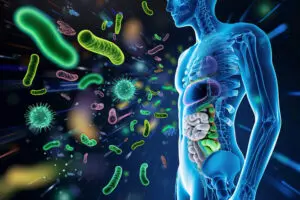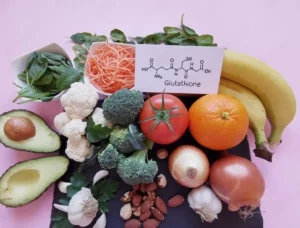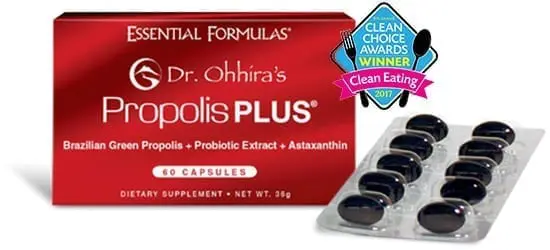By Ross Pelton, RPh, PhD, CCN
Scientific Director, Essential Formulas
The most common nutritional deficiency in America, and increasingly worldwide, is the malnourished microbiome. If the microbiome is not well nourished, pathogens are allowed to grow. We all harbor some pathogens, but they are not harmful when they only exist in small numbers. When pathogens proliferate, they can cause a wide range of symptoms such as gas, bloating, inflammation, pain, diarrhea, and/or constipation. Collectively, these symptoms are referred to as dysbiosis, which is also known as intestinal permeability.
It all begins in the (leaky) gut.
Industrialized countries are experiencing an epidemic of chronic inflammatory diseases such as Crohn’s Disease and ulcerative colitis.i A recent survey published in the American Journal of Gastroenterology reported that approximately two-thirds of Americans regularly suffer from gastrointestinal symptoms.ii
However, the health problems associated with dysbiosis and intestinal permeability/leaky gut are not limited to the intestinal tract. Intestinal permeability increases the risk of developing a wide range of more severe diseases. Excluding diseases related to congenital genetic disabilities, it is not an exaggeration to state that virtually all conditions are associated with a dysfunctional gut microbiome.
The Cause of Microbiome Malnutrition
Microbiome malnutrition occurs when people do not eat the types of food that probiotic bacteria require. There are two classes of compounds that are the primary food for probiotic bacteria: dietary fibers and polyphenols. However, studies report that 90-95% of American children and adults DO NOT consume the recommended daily amount of dietary fiber.iii,iv Other studies report that most Americans do not consume adequate fruits and vegetables, which are the primary source of polyphenols.v
The studies cited above reveal that most Americans DO NOT consume a diet that supports the maintenance of a healthy microbiome. Poor diets, specifically the over-consumption of processed foods and minimal consumption of fresh plant-based foods, are primary issues responsible for Americans’ poor health. In the United States, and increasingly in other countries, we are witnessing an epidemic of epidemics. We have an epidemic of cancer, heart disease, obesity, autoimmune disorders, type 2 diabetes, non-alcoholic fatty liver disease, depression, anxiety, autism, ADHD, to name a few.vi
Quantity vs. Diversity
Many people mistakenly think that taking high-dose probiotics is how to create or support a healthy microbiome. Balance and diversity are required for a healthy microbiome. In most ecosystems, ranging from the Amazon rainforest to your gut microbiome, greater diversity equates to more excellent health, strength, and resilience. High-dose probiotics work AGAINST microbiome balance and variety. Taking high-dose probiotics is NOT the best method to correct intestinal problems and achieve microbiome diversity.
Postbiotic Metabolites
Until recently, we didn’t understand how probiotic bacteria provide health benefits. That mystery is starting to be solved, and the answer is POSTBIOTIC METABOLITES. When probiotic bacteria are supplied with dietary fibers and polyphenols, they ferment these compounds in the colon, which results in the production of compounds known as postbiotic metabolites.
Postbiotic metabolites are increasingly being understood as critical health-regulating compounds in the body. If people do not consume adequate dietary fibers and polyphenols, their microbiome and health will suffer. In a book titled The Mind-Gut Connection, author Emeran Mayer, MD, stated that your probiotic bacteria are probably capable of producing hundreds of thousands of postbiotic metabolites.vii But these health-regulating metabolites can only be produced if an individual consumes a wide range of plant-based foods.
Diversity, Diversity, Diversity
As I mentioned earlier, greater diversity makes ecosystems healthier, stronger, and more resilient. The ONLY way to achieve greater diversity in your microbiome is to consume more plant-based foods. This will supply a more diverse range of the foods (dietary fibers & polyphenols) bacteria require, which will support the growth and proliferation of a more diverse range of probiotic bacteria.
When a more diverse population of probiotic bacteria can thrive, they will produce a more diverse range of postbiotic metabolites, increasing your microbiome’s strength and resilience and improving your overall health.
Dr. Ohhira’s Probiotics
Dr. Ohhira’s Probiotics are produced in a multi-year fermentation production process that creates over 500 postbiotic metabolites. Thus, taking Dr. Ohhira’s Probiotics provides a diverse range of postbiotic metabolites, which is highly effective in helping to develop or maintain a healthy microbiome. Dr. Ohhira’s Probiotics is the leading product globally for the direct delivery of postbiotic metabolites directly into the human gastrointestinal tract.
Don’t be a Victim of Microbiome Malnutrition.
Make sure your daily diet contains a wide range of fresh, organically grown plant-based foods, which are required to support the growth of your innate population of probiotic bacteria. But, since most people do not consume a diverse range of plant-based foods every day, we recommend taking Dr. Ohhira’s Probiotics daily. The postbiotic metabolites in Dr. Ohhira’s Probiotics will help maintain a healthy microbiome ecosystem, which will promote better digestion, improved nutrient absorption, a more robust immune system, and better overall health.






